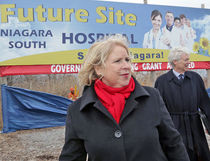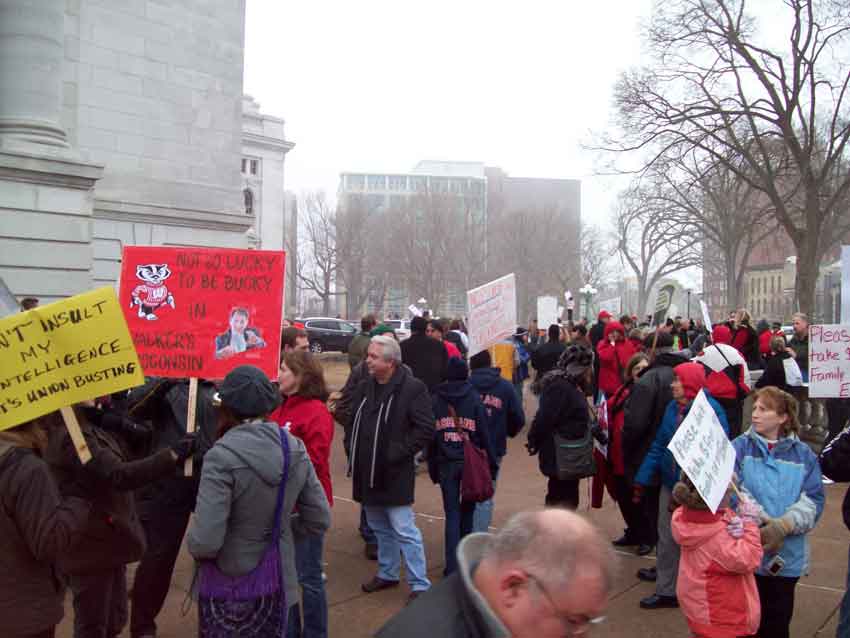BURLINGTON, ON.
January 17th, 2014
February 13th Ontario electors in Thornhill and Niagara Falls will head to the polls. Thornhill Tory MPP Peter Shurman resigned over expense claims and Liberal maverick MPP Kim Craitor hung up his gun belt late last year. Premier Wynne led off the campaigns promising a new hospital for Niagara. The NDP’s Horwath seems to be hiding, waiting for public input. But Tory opposition leader Hudak has rolled out a bold new policy called the Million Jobs Act. That is a million jobs created over the next eight years. Yes, eight years.
 His strategy begins by cutting corporate taxes to 10 percent, the level former Premier McGuinty was targeting before Andrea Horwath and minority government stopped him. Still, at 11.5% today Ontario has one of the lowest rates in the country. When federal and provincial rates are combined, total corporate taxes in Ontario are well below those in the US. So why is this so important? When you cut taxes, you cut revenues and that means your deficit increases. And as far as job creation driven by tax cuts – that disproven, revisionist, ’Reagan era’ piece of voodoo economics is not supported by any credible economist, anywhere.
His strategy begins by cutting corporate taxes to 10 percent, the level former Premier McGuinty was targeting before Andrea Horwath and minority government stopped him. Still, at 11.5% today Ontario has one of the lowest rates in the country. When federal and provincial rates are combined, total corporate taxes in Ontario are well below those in the US. So why is this so important? When you cut taxes, you cut revenues and that means your deficit increases. And as far as job creation driven by tax cuts – that disproven, revisionist, ’Reagan era’ piece of voodoo economics is not supported by any credible economist, anywhere.

Ontario hasn’t managed – yet – to make the renewable energy sector really come alive – but they are going in the right direction.
Hudak further disappoints by echoing the misinformation being churned out by Ontario’s right-wing dailies, blaming the tiny renewable energy sector for Ontario’s high energy costs. As I pointed out in my Dec 14th column, energy rates are high, and getting higher, in large part because Harris and Eves fumbled deregulation and privatization, back when Hudak was a member of their Tory caucus. Was he sleeping and missed it or is he just being disingenuous? It’s not McGuinty’s renewable energy policy but his government’s inability to fix the system that is costing us.
Hudak’s million jobs legislation would bring Ontario into the ‘New West Partnership’, a deal currently among British Columbia, Alberta and Saskatchewan to eliminate trade barriers. It is hard to understand why we Canadians can conclude all those international free-trade deals yet we don’t even have free-trade among ourselves. Wouldn’t it be nice to see one of those excellent BC wines in the LCBO? This is no-brainer policy, and a good one, but it will hardly get us to a million jobs.
Hudak has promised to freeze civil service wages, a reasonable position for a government in deficit, though he appears soft on continuing Harris-era management bonuses, which the Liberals have frozen. Picking on the civil service unions is a key part of his greater strategy – to de-unionized Ontario – turning the province into one of those Tea Party ‘right-to-work’ places he admires south of the border? If freezing civil servant wages doesn’t give him the labour war he wants, then eliminating thousands of education jobs sure will.
To his credit, there is some evidence that high levels of unionization may retard employment growth and, perhaps, even productivity. Unions are a barrier to labour mobility, after all. But trade unions also complement the human relations responsibilities of management – so it depends on what you are measuring. For example, most skilled trade guilds have qualifications criteria and experience as a screening pre-requisite for membership. And unions often form the backbone of workplace committees on health and safety, anti-harassment, conduct and discipline – all of which lighten the load of management and often reinforce normal management actions.
Let’s not forget that the labour movement and progressive taxation is what created the once powerful middle class in our society. Unions’ bargaining power shifted more of the returns from production to labour, putting more money into pay packets which enabled greater consumption by the middle class and spurred economic growth. In addition, the mere existence of large unions helped pull up the incomes of non-unionized workers, the ’free-riders’, particularly when labour markets were tight. It is a complicated issue with potentially serious repercussions for hasty, thoughtless ideologically driven action.
It is no coincidence that the drop in union numbers over the last several decades has been accompanied by an increasing spread in income and wealth between the richest and the rest of us. Without the unions’ collective agreements, progressive governments would be forced to increase minimum wages to well beyond where they are today. And governments of all stripes would need to exercise greater regulatory oversight over workplaces and workplace rules, meaning more, not less, red tape for the business community.
The Million Dollar Jobs plan is really a little bit of good, some bad and a lot of ugly. And even spread over eight years there is no way that Mr. Hudak will see anything like a million jobs from his proposed legislation. Still, it is a catchy piece of marketing which may well attract voters to the PCs in the by-elections — even if it is mostly nonsense.

If you want you to know they really care – they will spend some of your money on you. Burlington knows all about that stuff – we got our hospital didn’t we?
We will know better as the campaigns unfold. The NDP has to decide if they want to stick their necks out and if so how far and perhaps advance some policy. The Liberal government has to roll out the rest of their campaign. The word on the street is that these by-elections are only primers for a general election coming sometime this spring or early summer. So expect to see the parties taking some risks to test the voting appetite for ideas, which is exactly what Mr. Hudak has just done.
 Ray Rivers writes weekly on both federal and provincial politics, applying his more than 25 years as a federal bureaucrat to his thinking. Rivers was a candidate for provincial office in Burlington where he ran against Cam Jackson in 1995, the year Mike Harris and the Common Sense Revolution swept the province. He developed the current policy process for the Ontario Liberal Party.
Ray Rivers writes weekly on both federal and provincial politics, applying his more than 25 years as a federal bureaucrat to his thinking. Rivers was a candidate for provincial office in Burlington where he ran against Cam Jackson in 1995, the year Mike Harris and the Common Sense Revolution swept the province. He developed the current policy process for the Ontario Liberal Party.
Background inks:
Million Job Act Tax Cuts and Jobs Corporate Tax Cuts Not the Time to Cut
Unions and Employment Hudak and Unions Energy Myths Energy Subsidies




















Well written, informed article which obviously stimulates a healthy exchange of similarly informed points of view.
If only those in power could separate politics from governance.
What we have now is politicians playing political games with our governance. We have rhetoric about ‘no new taxes’, ‘lower business taxes’ etc. The catchy slogans appeal to many people who think all problems can be solved in a 30 second sound bite.
We do, or used to have, prior to government cut-backs, many bright scientists / economists working for the universities and the government to develop sound evidence based policy. Those plans are politically neutral and are what should be implemented.
Being in power is not about doing what is best for your country, as I always thought it was. It’s about getting re-elected to retain power. Until a leader has the back-bone to put his or her country above the political party, we, as a country, are in a down-ward spiral.
Thanks for your articles Mr. Rivers. Your insight is appreciated.
Mr. Hudak’s job plan is a joke and will do nothing to create jobs. As a business owner, there are only two ways I will create new positions, 1) our business volume increases and I need more staff to handle the customers r 2) the Government provides a direct wage benefit to cover the cost of some interns (like the Liberal Youth Fund).
Hudak’s plan does nothing to urge me to create any jobs. Just more Conservative hollow policies.
I really hope the NDP get back in. Raise taxes, increase the minimum wage, and suck the motivation out of any work ethic that barely exists today. Let’s pay people to stay home, get gift cards for spoiled food, and kill the economy. Group hug time.
We need a revolution.
I’m not sure that I have ever heard of non-unionized workers being referred to as “free riders” before.
Because unionized workers will still pay their union dues, they will still collectively bargain. The advantages in wages, benefits and representation that they achieve will pass to the remainder of the workers in order for the employer to appear to be equitable and avoid another unnecessary employment division.
By not paying dues, the free-loaders/free-riders will diminish the ability of unions to organize and represent, which will diminish the work experience for all workers. Stronger unions benefit all workers and management as they act as the only compulsorily democratic and ethical component in the workplace. The “Right to Work” mantra is nothing less than a surrender of belief that management and labour can work together respectfully to provide a better product and service at the best price. It is foolish to expect that labour unrest will guarantee increased productivity.
Hi Bob, I’ve just never heard of such a large group of working Ontarians defined in such terms before. Are there any in the unionized sector, private or public, who you would consider to be “free-riders” and “free-loaders” too? Or do these terms only apply to those who are not “organized”.
This Province has lost 300,000 manufacturing jobs and added 300,000 public sector jobs in the last ten years. I’m not sure that this is the “work experience” that Ontarians will require moving forward?
HI Tony – I am only commenting for clarification. I used the term ‘Free Rider’ to signify the fact that non-union workers salaries also get lifted when unions negotiate higher wages for their membership. I am not passing judgement on non-union workers – it is a technical term and is not pejorative.
Thank you for reading and please keep commenting – I enjoy reading everyone’s comments.
Ray
Got it Ray! Thanks for clarifying, and affirming that my comments are welcome here.